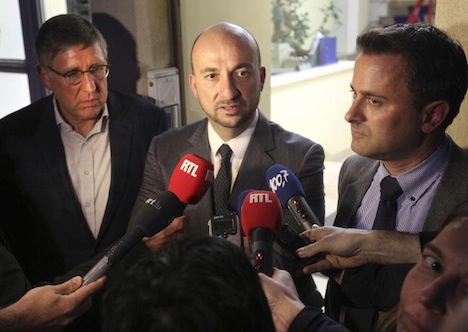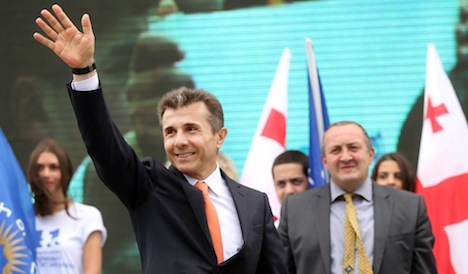The three parties that finished in second, third and fourth place, respectively, in Luxembourg’s October 20 election will begin coalition talks, which could bring to an end the 18-year premiership of Jean-Claude Juncker, thereby elevating the current mayor of Luxembourg City, Xavier Bettel as Luxembourg’s next prime minister — and the country’s first openly gay prime minister. ![]()
Bettel’s party, the liberal Demokratesch Partei (DP, Democratic Party), made gains in the weekend’s election at the expense of Juncker’s center-right Chrëschtlech Sozial Vollekspartei (CSV, Christian Social People’s Party) and Juncker’s previous coalition partner, the center-left Lëtzebuerger Sozialistesch Arbechterpartei (LSAP, Luxembourg Socialist Workers’ Party).
The CSV still won more votes than any other party (as it has in every postwar Luxembourgish election except 1964). But by banding together, the LSAP, the Democrats and the Gréng (the Greens) would make history by giving Luxembourg its first so-called ‘Gambia’ coalition, named after the three colors of the Gambian flag — green, red (LSAP) and blue (Democrats). Together, the three parties hold 32 seats (each of the LSAP and the Democrats won 13 seats, while the Greens have six) in the 60-member D’Chamber (Chamber of Deputies), Luxembourg’s unicameral parliament.
But Luxembourg’s snap elections came about only because the LSAP refused to support Juncker in a key vote earlier this summer related to a scandal involving the country’s intelligence service, the Service de renseignement de l’Etat luxembourgeois (SREL). Though Juncker wasn’t directly responsible for the SREL’s misdeeds, which included illegal surveillance of domestic groups within Luxembourg, he was determined to be politically liable for the oversight of the SREL, which even allegedly recorded a telephone conversation between Juncker and Luxembourg’s grand prince Henri. Rather than face the humiliation of losing a vote of no confidence, Juncker instead resigned in July and called for snap elections.
Bettel, who leads the Democrats, already has a strong working relationship with the Greens and their leader, François Bausch, due to their cooperation governing Luxembourg City, the small duchy’s capital. In preliminary discussions, LSAP leader Etienne Schneider (pictured above, center, with Bettel right and Bausch right) agreed that Bettel would lead any ‘Gambia’ coalition government.
The next step would be for grand duke Henri to formally invite Bettel to become the formateur of a new government at a meeting on Friday afternoon. Thereupon, it would be up to Bettel to bring together the three parties in crafting an agenda to govern Luxembourg.
Though the three parties lie on different points of the ideological spectrum, their government would represent a massive change from decades of center-right CSV rule under Juncker and his predecessors Jacques Santer and Pierre Werner. Bringing a new party — and a new generation of leadership — into power in Luxembourg could in itself mark a welcome rupture, breathing fresh ideas into Luxembourg’s government and turning the page from the SREL scandal, the roots of which go back to the 1980s.
Moreover, all three parties are more socially liberal than the CSV, which could result in looser abortion laws and could also clear the way for the recognition of same-sex marriage. Though Juncker personally supports marriage equality and had been pushing for a vote on a marriage equality bill before calling snap elections, it remains contentious within the CSV. A Bettel-led government would almost certainly pick up the legislative fight where Juncker left off.
The three parties might also find common ground on wage indexing and measures to curb unemployment. While Luxembourg has one of the wealthiest and strongest economies within the eurozone, the country’s unemployment ticked up from around 5% a year ago to 5.8%, as of August.
It would also make Bettel, at age 40, one of a growing number of Europe’s young vanguard of leaders, alongside Italian prime minister Enrico Letta (age 47), British prime minister David Cameron (age 47) and Finnish prime minister Jyrki Katainen (age 42). Bettel would also become the third openly gay head of government in Europe (after Belgian prime minister Elio Di Rupo and former Icelandic prime minister Jóhanna Sigurðardóttir).
Continue reading Bettel now tipped to become Luxembourg’s next prime minister, ending Juncker era

